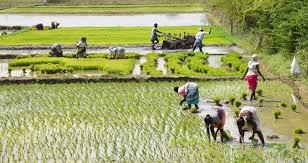Haryana: Rain deficit hits paddy crop, farmers turn to groundwater
By Parveen Arora
Major paddy-growing districts in the state, including Karnal, Kaithal and Kurukshetra, have recorded low rainfall this pre-monsoon and monsoon season from June 1 to July 26, forcing farmers to depend on groundwater for irrigating their fields to save their paddy crop.
Haryana has witnessed nearly 39 per cent fall in rainfall compared to the average. From June 1 to July 26, the state recorded 109.4 mm of rainfall whereas the average for this period is 179.9 mm. In July, Haryana witnessed 80 mm of rainfall against an average of 125.2 mm, which is approximately 36 per cent below the average for July.
Karnal cultivates paddy on 4.25 lakh acres, Kaithal on 4.12 lakh acres and Kurukshetra on nearly 2.9 lakh acres, said the data of the Agriculture and Farmers Welfare Department.
Karnal, renowned for its rice production, received only 53.7 mm of rainfall from June 1 to July 26, which is nearly 77 per cent below the average. The average rainfall of this period is 233 mm.
Kaithal, another major paddy district, experienced a 66 per cent decline in rainfall in comparison to the average rainfall. It has recorded only 53.6 mm compared to the average of 157.3 mm. Similarly, Kurukshetra district, which is also a major paddy-growing district, witnessed a 54 per cent decrease in rainfall. It has recorded 81 mm rainfall against the average of 178.2 mm during this period.
This severe deficit has raised concerns about the potential impact on the paddy crop. Farmers, who had high hopes on the monsoon, are now worried about their crop. They said that the rainfall deficit has made them dependent on groundwater for irrigation of their fields.
“This current monsoon has disappointed us and we are now dependent on tubewells for irrigation for which the power supply is for limited hours. It should be raised to 10 hours from the promised eight hours,” said Rajinder Kumar, a farmer from Karnal.
Sanjeev Kumar, another farmer, echoed similar sentiments, highlighting that the power supply is for limited hours. “We were highly dependent on the monsoon, but now, we have only one option — to rely on tubewell. The power supply is for limited hours with long cuts. The power supply should be increased,” he added.
Dr Virender Singh Lather, former Principal Scientist ICAR-IARI, New Delhi, pointed out that this year, monsoon has caused distress among farmers. “Due to less rainfall, load has been increased on groundwater. Farmers should adopt direct-seeded rice (DSR) technology for paddy transplantation which requires very less water,” he suggested.
This article has been republished from The Tribune.

